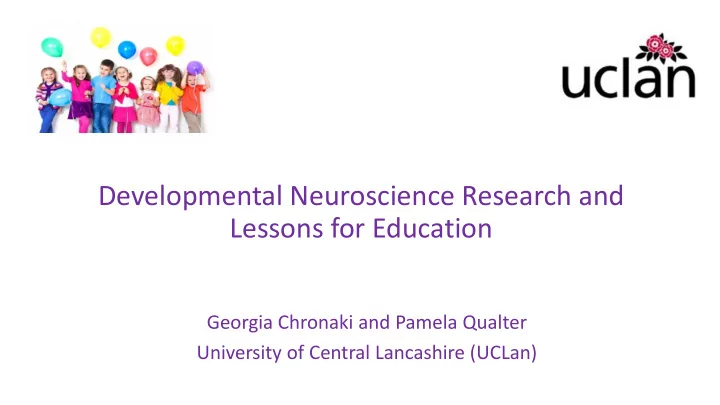

Developmental Neuroscience Research and Lessons for Education Georgia Chronaki and Pamela Qualter University of Central Lancashire (UCLan)
Overview Why we study brain development Research findings Implications Discussion
Developmental neuroscience research Developmental cognitive and affective neuroscience published articles 1996-2009, Source: Scopus
Typical brain development Brain Development
The impact of experience on brain development Institutionalised Never Institutionalised Red/orange color indicates more brain activity. Source: Nelson (2008); Marshall, Fox, & the BEIP Core Group (2004).
The Social Brain Prefrontal cortex -Planning Limbic System -Organisation e.g. Emotion, reward -Decision-making Regions of the prefrontal cortex consistently show decreased activity during mentalizing tasks between late childhood and adulthood (review by Blackmore & Robbins, 2012, Nature Neuroscience)
Cognitive and socio-emotional brain systems The brain centre that controls emotionally arousing information (limbic system) is extra active during adolescence while at the same time the ‘cognitive control’ system continues to mature. Source: Steinberg, 2008 See also Somerville & Casey, 2010
Implications for Education • Adolescence is a period when the brain is particularly malleable and shaped greatly by the environment. • This offers a window of opportunity for learning. Research can help transform policy and enable designing programs to optimize learning. • The timing of intervention and training is important for maximising training effects in a period when the brain shows greater plasticity.
Mental Health in Young People
Example of recent work: ADHD and Vocal Anger Children With ADHD Children without ADHD The brains of children with ADHD respond more to angry voices Chronaki et al. 2015, JCPP
Thank you for listening! Contact Details: E-mail: GChronaki@uclan.ac.uk Tel: 01772 894454
THE SOCIAL BRAIN: THE The social brain: the special case of SPECIAL CASE OF loneliness LONELINESS Pamela Qualter University of Central Lancashire (UCLan)
What is Loneliness? What is loneliness? Investigating Hyper-vigilance for Social Threat of Lonely Children and Adolescents Loneliness is the difference between desired and actual social relations (Perlman & Peplau, 1981) - either in quantity or quality of relationships (or both).
Loneliness is adaptive: Loneliness is an evolutionary mechanism Loneliness makes us want to reconnect with others (Cacioppo et al., 2006)
Contradictions in The Evolution of Loneliness Mechanism Loneliness makes us unhappy, but also unsafe (Cacioppo, Cacioppo, & Boosma, 2013)
Loneliness and Implicit Attention to Social Threat: A High Performance Electrical Neuroimaging Study Source:Cacioppo, S., Bangee, M., Balogh, S., Cardenas-Iniguez, C., Qualter, P., & Cacioppo, J.T. (2016). Loneliness and Attention to Social Threat: A High performance electrical neuroimaging study. Cognitive Neuroscience, 08/2015 . doi: 10.1080/17588928.2015.1070136 Pamela Qualter.
Cortical source estimation and template maps for the discrete microstates evoked in lonely individuals common to both conditions (A) or specifically elicited in response to social threat (B) or nonsocial threat (C) stimuli. Pamela Qualter.
Cortical source estimation and template maps for the discrete microstates evoked in nonlonely individuals common to both conditions (A) or specifically elicited in response to social threat (B) or nonsocial threat (C) stimuli. Source: Cacioppo, et al., under review Pamela Qualter.
Loneliness in the short term is adaptive, but it is not adaptive if prolonged
Implications for Education Intervention, intervention, intervention!
Contact Details: PQualter@uclan.ac.uk, 01772 893877
Recommend
More recommend